Title of Productivity and Innovation Initiative
Baguio Contact Tracing Ecosystem
Implementing Agency
City Government of Baguio, Benguet
Year Implemented
March 2020-Present\
Themes
Management for Productivity, Quality, and Agility, Digitization & New Technologies, Perspectives on Productivity, Governance, and Development
General Description
The City Government of Baguio developed the Baguio Contact Tracing Ecosystem to serve as the main platform for implementing its plans and strategies against COVID-19. The system harmonizes seventeen cluster areas headed by health professionals with about 20 to 40 members per cluster, using epidemiological analysis to study the spread of the virus across the population. The organizational framework also includes an auxiliary team composed of police officers, investigators, and medical technicians.
Background and Problem
Through the years, the Baguio LGU has dealt with numerous infectious diseases such as Severe Acute Respiratory Syndrome (SARS), meningococcemia, vaccine-preventable diseases, food and waterborne diseases, and dengue through the effort of the Health Services Office (HSO) City Epidemiology and Surveillance Unit (CESU). Learning from these past outbreaks, the CESU has emphasized contact tracing as an essential tool for public health. However, despite myriad reasons to establish a contract tracing system, such as the 2005 Meningococcemia outbreak which severely affected Baguio’s tourism industry and the fact that more than 70 Filipinos dying every day due to tuberculosis, the necessary technology has not been given much attention in the Philippines until the outbreak of COVID-19.
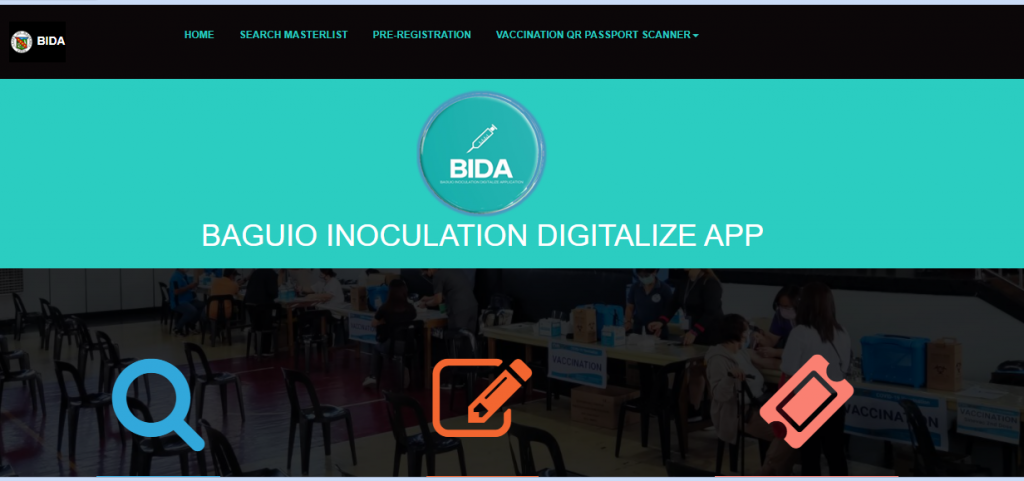
Solution and Impact
Given his experience as the Director of the Criminal Investigation and Detection Group from 2013 to 2015, Mayor Magalong, in April 2020, gathered the city’s epidemiologists, information technology experts, software engineers, computer programmers, and the police to discuss the development of a homegrown contact tracing mobile application. It took only two weeks of preparatory work to integrate health informatics with information technology, allowing the Baguio LGU to launch the app while simultaneously training the staff on using it.
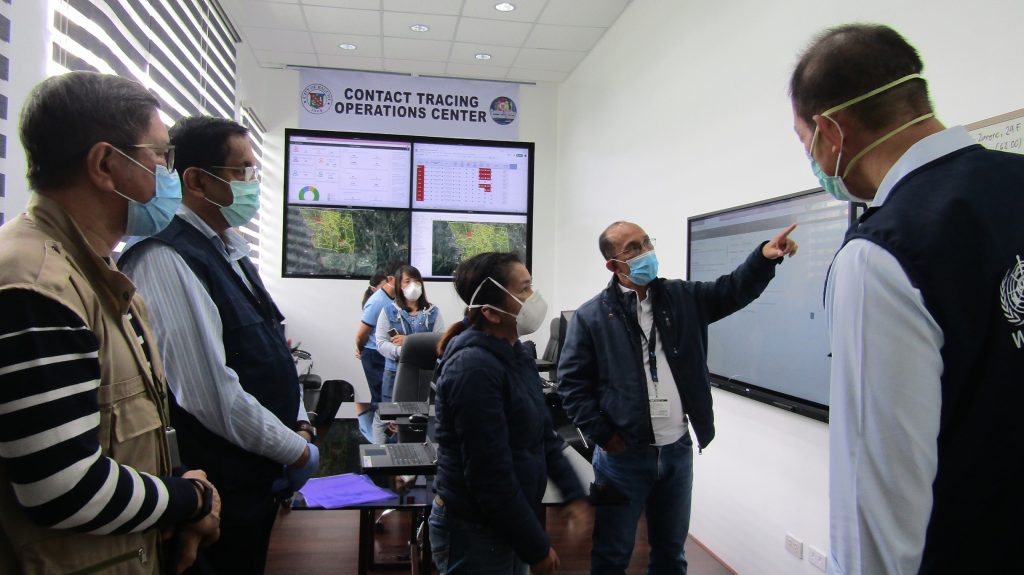
The contract tracing system is composed of police, doctors, healthcare workers, barangay health emergency response teams (BHERTS), 5-10 swab teams, a lockdown team (composed of lawyers formulating the lockdown order), disinfection teams from the city government and barangays, encoders, analysts, programmers, and technical support. This setup allows other LGUs to easily replicate this system since the city only utilized its existing manpower and resources to implement it.
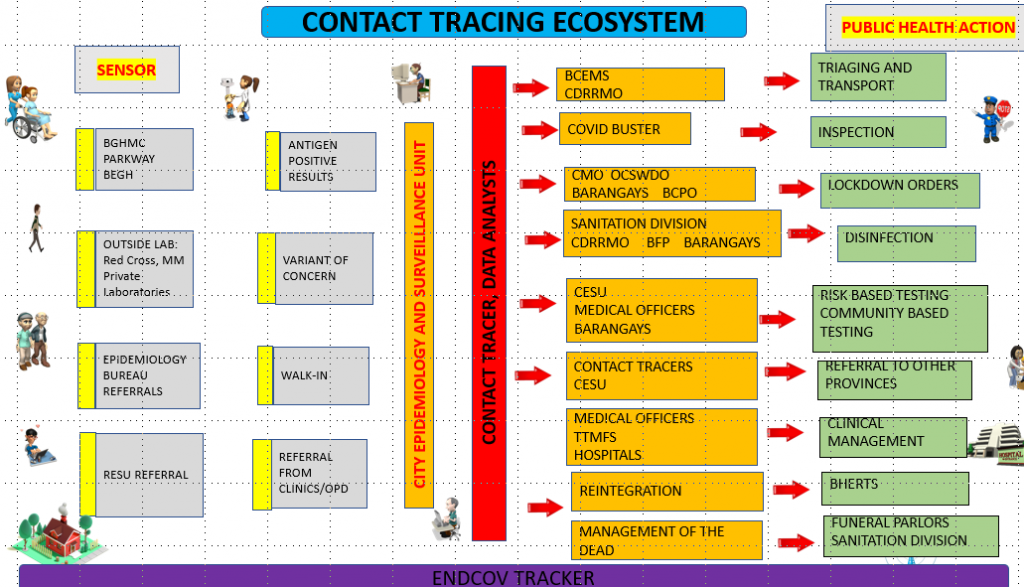
The Baguio Contact Tracing Ecosystem uses visualizations created by its communications team to make the numbers and information more understandable to the public. It also serves as an operational tool to collect and analyze COVID-19 case data as well as a geographic information system platform. The system can generate reports required by national government agencies such as the Department of the Interior and Local Government (DILG) and the Department of Health (DOH), using IBM Security i2 Analyst’s Notebook software which reveals relationships between a person and the virus across space and time using the ELP (entity-link-property) methodology. This allows the system to show the possible link between COVID-19 cases, from whom the virus originated, and who will be the next person to be infected, which the HSO acts on by instituting preventive and control measures to stop the spread of the virus. Lastly, CESU also uses a Geographic Information System (GIS) to geotag all COVID-19 cases in any area, leading to better decision-making for the city government to ease restrictions.
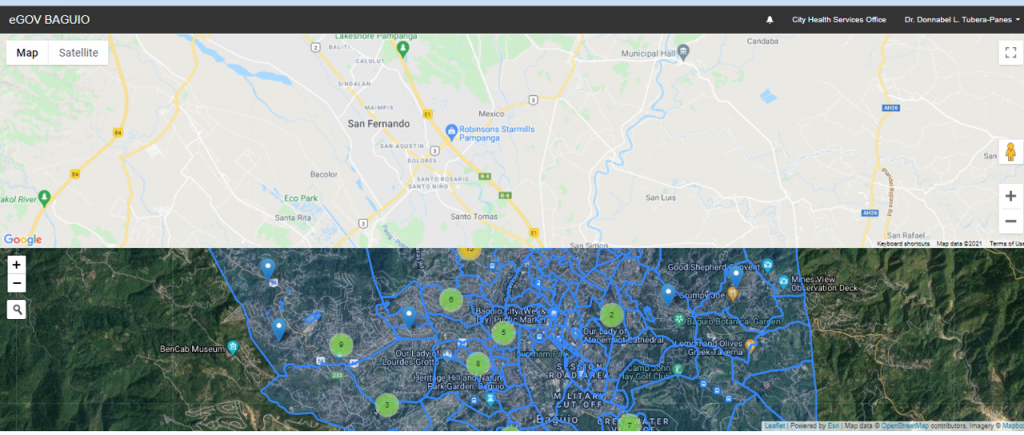
What sets the Baguio Contact Tracing Ecosystem apart from other contact tracing solutions is that it uses a patient-centered approach that emphasizes the continuity of care from diagnosis, treatment, recovery and even post-illness economic relief. Furthermore, the system is integrated within the LGU’s different offices and units, allowing for the coordination of different efforts in social welfare and public order and safety.
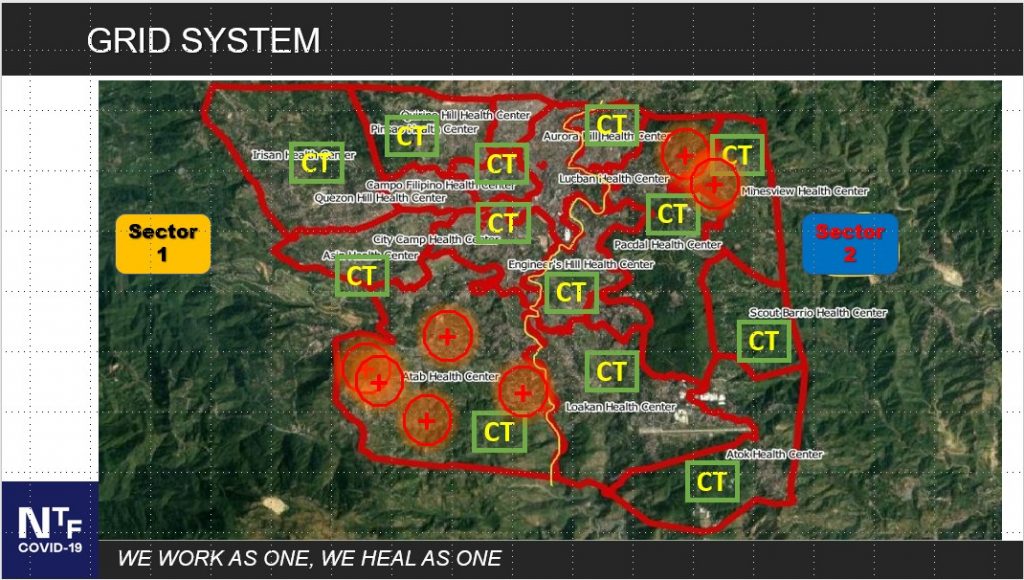
Because of this application, the Baguio LGU was also able to implement evidence-based decision-making to lessen the economic impact of the pandemic, as it was the first LGU to implement granular lockdowns. Residents of the city can confidently rely on a robust and transparent contact tracing system implemented by the LGU, which has also strengthened the value of being truthful, especially when declaring symptoms or the location of possible COVID-19 cases. Lastly, the system has granted the LGU and the city confidence that they could capably manage such large-scale disasters.
The system has also adapted to the shifting context of the pandemic, expanding its services from just contact tracing to scheduling and tracking vaccinations and telemedicine consultations. New features include the generation of paperless vaccination certificates for its citizens and a telemedicine platform.
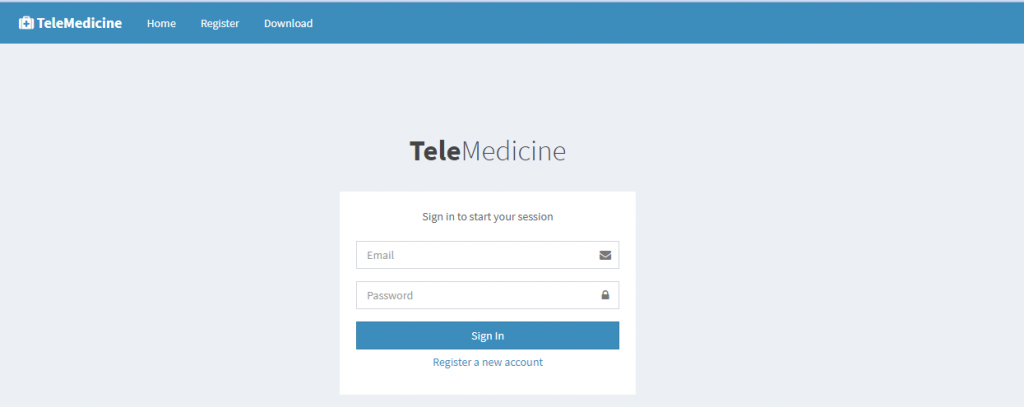
Milestones
The system was first launched on 20 March 2020 and it can be accessed at http://endcov19.baguio.gov.ph.
On 10 July 2020, the World Health Organization led by WHO Western Pacific Regional Director Dr. Takeshi Kasai and WHO Philippine Representative Dr. Rabindra Abeyasinghe, and DOH Undersecretary Dr. Gerardo Bayugo honored the city and its provincial governments with a field visit to learn about their best practices in managing the COVID-19 pandemic.
The system won third place nationwide as the Best in COVID-19 response in the 2020 Digital Governance Awards organized by the Department of Information and Communications Technology (DICT), Department of the Interior and Local Government (DILG), and the National ICT Confederation of the Philippines (NICP) last 14 December 2020. It was also featured in sharing sessions for Myanmar in January 2021 and South Korea in October 2021.
Testimonials
“On a recent visit to Baguio, I was impressed to see first-hand the system that contact-tracing czar. And Baguio City Mayor, Hon Benjamin Magalong, and his team are implementing to #BeatCOVID19.â€
Dr. Takeshi Kasai, Western Pacific Regional Director, World Health Organization, 26 July 2020.
“Baguio City is far ahead in their contact tracing because local officials are working together with health officials. This should be replicated in other LGUs in the Philippines,â€
Dr. Rabindra Abeyasinghe, Philippine Representative, World Health Organization.
Sources
Cabreza, V. (2020, May 28). Philippines top stories: Politics, environment, education, trending. Inquirer.net. Retrieved April 8, 2022, from https://newsinfo.inquirer.net/
Department of Interior Local Government Cordillera Administrative Region. (n.d.). 2020 DG award: Baguio is Country’s third best in covid-19 response. Department of Interior Local Government Cordillera Administrative Region. Retrieved April 8, 2022, from https://car.dilg.gov.ph/field-office/dilg-baguio-city-home/19-dilg-baguio-city/88-2020-dg-award-baguio-is-country-s-third-best-in-covid-19-response
World Health Organization. (n.d.). WHO field visit to Baguio City and Benguet Province: Models for contact tracing and covid-19 response in the Philippines. World Health Organization. Retrieved April 8, 2022, from https://www.who.int/philippines/news/detail/29-07-2020-who-field-visit-to-baguio-city-and-benguet-province-models-for-contact-tracing-and-covid-19-response-in-the-philippines
